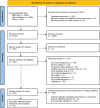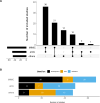External validation of AI-based scoring systems in the ICU: a systematic review and meta-analysis
- PMID: 39762808
- PMCID: PMC11702098
- DOI: 10.1186/s12911-024-02830-7
External validation of AI-based scoring systems in the ICU: a systematic review and meta-analysis
Abstract
Background: Machine learning (ML) is increasingly used to predict clinical deterioration in intensive care unit (ICU) patients through scoring systems. Although promising, such algorithms often overfit their training cohort and perform worse at new hospitals. Thus, external validation is a critical - but frequently overlooked - step to establish the reliability of predicted risk scores to translate them into clinical practice. We systematically reviewed how regularly external validation of ML-based risk scores is performed and how their performance changed in external data.
Methods: We searched MEDLINE, Web of Science, and arXiv for studies using ML to predict deterioration of ICU patients from routine data. We included primary research published in English before December 2023. We summarised how many studies were externally validated, assessing differences over time, by outcome, and by data source. For validated studies, we evaluated the change in area under the receiver operating characteristic (AUROC) attributable to external validation using linear mixed-effects models.
Results: We included 572 studies, of which 84 (14.7%) were externally validated, increasing to 23.9% by 2023. Validated studies made disproportionate use of open-source data, with two well-known US datasets (MIMIC and eICU) accounting for 83.3% of studies. On average, AUROC was reduced by -0.037 (95% CI -0.052 to -0.027) in external data, with more than 0.05 reduction in 49.5% of studies.
Discussion: External validation, although increasing, remains uncommon. Performance was generally lower in external data, questioning the reliability of some recently proposed ML-based scores. Interpretation of the results was challenged by an overreliance on the same few datasets, implicit differences in case mix, and exclusive use of AUROC.
Keywords: Acute deterioration; Electronic health records; External validation; Intensive care unit; Machine learning.
© 2024. The Author(s).
Conflict of interest statement
Declarations. Ethics approval and consent to participate: Not applicable. Consent for publication: Not applicable. Competing interests: The authors declare no competing interests.
Figures




References
-
- Vincent JL, Moreno R, Takala J, Willatts S, De Mendonça A, Bruining H, et al. The SOFA (Sepsis-related Organ failure Assessment) score to describe organ dysfunction/failure. On behalf of the Working Group on Sepsis-related problems of the European Society of Intensive Care Medicine. Intensive Care Med. 1996;22:707–10. - DOI - PubMed
Publication types
MeSH terms
LinkOut - more resources
Full Text Sources

